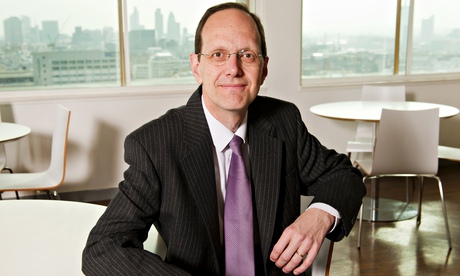
The head of Britain’s leading employers’ group has warned that bosses must take tackling inequality seriously, or run the risk that a widening gap between rich and poor will damage their companies.
John Cridland, director general of the CBI, said in an interview at the World Economic Forum in Davos that the business community understood that it had a responsibility to help people to earn more. “There have been a lot of conversations here about inequality having reached a point where it is not acceptable from a moral point of view and that, in a commercial sense, it’s bad for business,” said Cridland.
At the end of a week in which Oxfam released a report showing the richest 1% of people in the world were on course to own more wealth than the other 99%, Cridland said inequality was seen as “one of the reasons why business does not have the standing it would like to have”.
Cridland said he had made a point in Davos of promoting the CBI report A better off Britain, which last November called on firms to do more to tackle inequality by providing childcare and boosting the skills of employees. “People were genuinely surprised and impressed about what the CBI had to say.”
The governor of the Bank of England, Mark Carney, and Christine Lagarde, managing director of the International Monetary Fund, were among those in Davos raising the issue of worsening inequality. Cridland said that tackling inequality would benefit businesses in terms of both their reputation and their commercial prospects. “I am not sure this would have been natural territory for us five years ago.
“I have been banging on for a year about higher earnings growth. I have been doing that in part because it is a sensible part of economic rebalancing to have sustainable consumption. It is important that low-paid workers are able to play their part as active consumers in our economy.”
Cridland said a third of those who were on the minimum wage when it was first established in 1999 were still on it, but added that there should also be a focus on those struggling on slightly higher incomes.
He said high pay was a problem when it was not deserved, and drew a comparison with the wages earned by footballers. “The ordinary person struggling to buy a ticket for a football match thinks it is OK so long as the team is successful. If the team is not successful, they wonder why they are paying so much. There is less tolerance of business if people are not doing well.”
Last week’s jobless figures showed unemployment has fallen to its lowest level in more than six years, but earnings growth is well below pre-recession levels. The CBI chief said: “I am particularly interested in the escalator that takes people who are unemployed or low-paid on to better-paid work. Something has gone wrong with it. There are two or three missing steps in the middle.”
There was a tendency for semi-skilled posts to be filled by those who would once have been considered overqualified for them. “How does the barista become the skilled project leader or the sales team participant in a tech business, unless they are students in full-time employment, which some of them are?”
It was up to the state, Cridland said, to provide basic education, but it was for business to help people make progress in their careers: “Business has to look at how it can help people up the escalator.”

